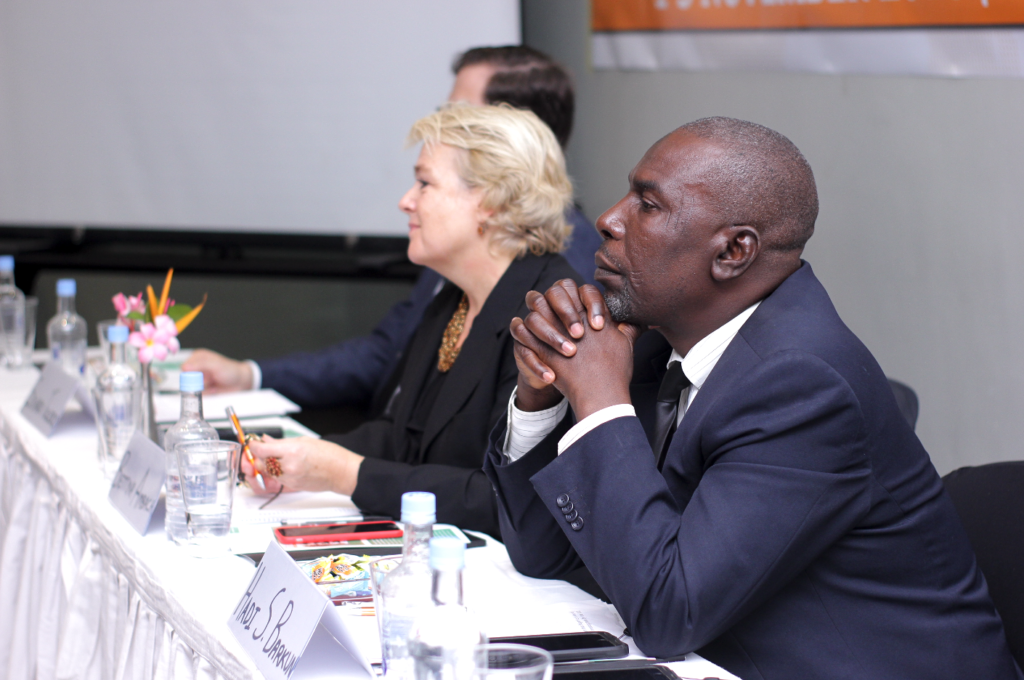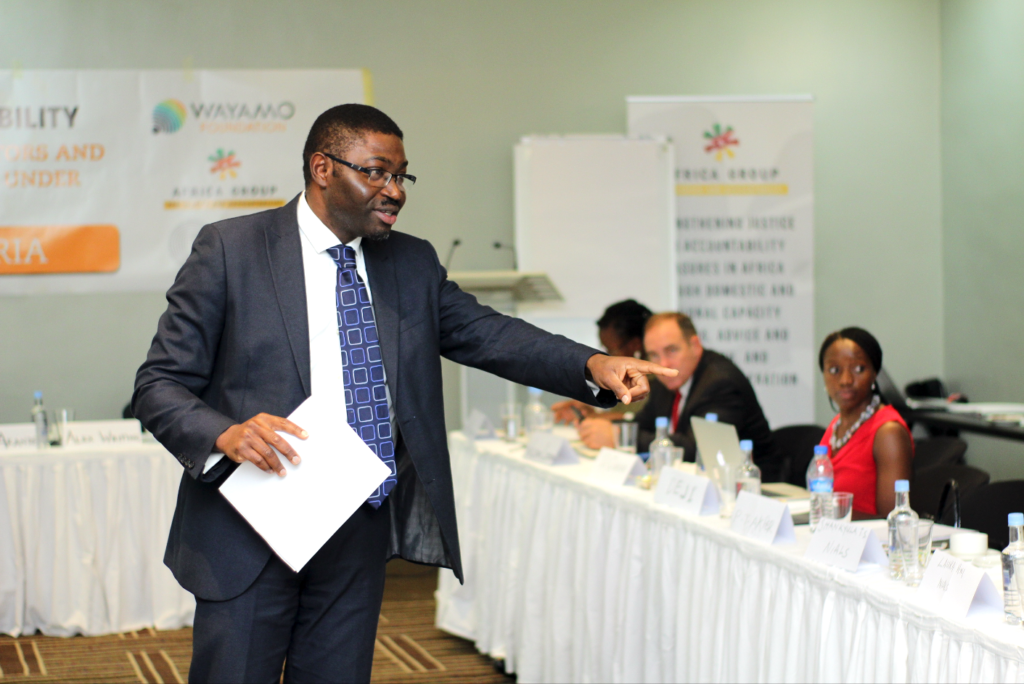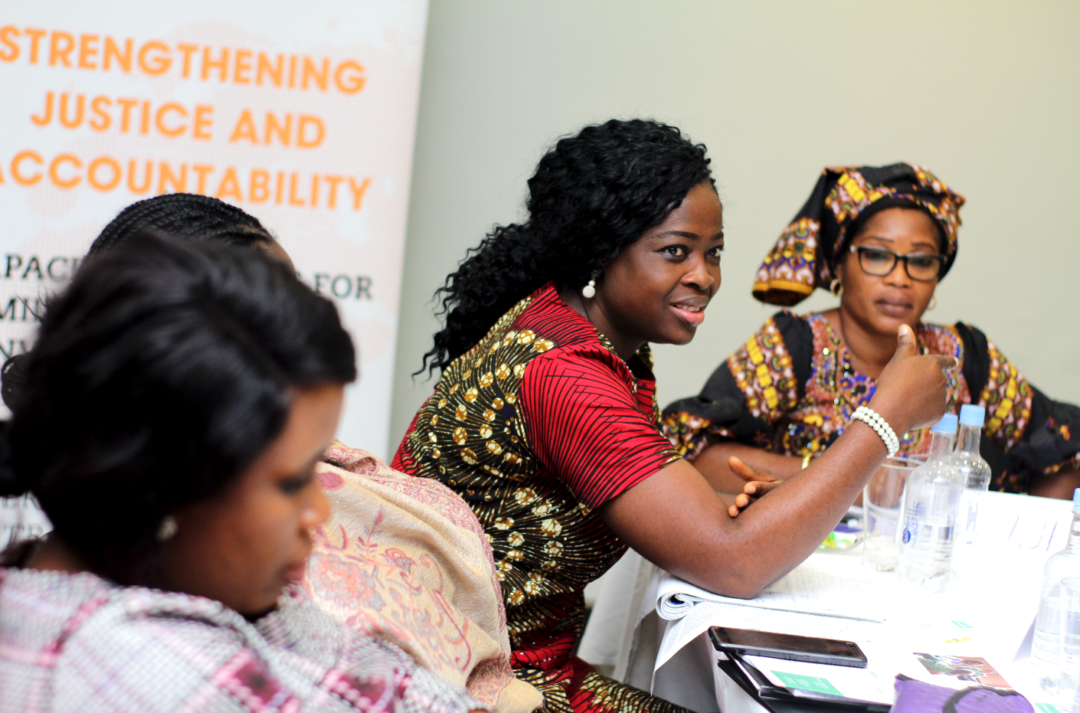Following on from five previous workshops on “Strengthening Justice and Accountability in Nigeria” held over the course of 2017 and 2018, the conclusion of the latest three-day session in Lagos, from November 1 to 3, marks the sixth in the series organised, promoted, designed and conducted by the Wayamo Foundation, the Africa Group for Justice and Accountability (AGJA) and the International Nuremberg Principles Academy.
Like its predecessors, this November 2018 edition was purpose-designed to impart joint training for investigators and prosecutors, both military and civil. The overall aim is to equip Nigerian prosecutors and investigators with the necessary expertise and skills to address the most serious and complex international, transnational and terrorism-related crimes under Nigerian criminal law, including crimes that may potentially fall under the jurisdiction of the International Criminal Court (ICC). In addition, and for the very first time, the workshop was attended by participants from the Joint Investigation Centre (JIC) based in Maidugiri and responsible for the investigation of Boko Haram crimes. Also participating for the first time were representatives of the Nigerian Institute for Advanced Legal Studies and the National Judicial Institute whose presence marks the beginning of a collaborative initiative regarding the implementation of future training programmes with a train-the-trainer component, seen as essential to ensuring the long-term sustainability and ongoing relevance of the work done to date.
The event was officially opened by Wayamo Foundation Director, Bettina Ambach, the Nuremberg Academy’s Senior Legal Officer,Eduardo Toledo, and the Head of the Complex Case Work Group and Deputy Director, Directorate of Public Prosecutions, Hadi Saleh Barkun.
To set the overall context in which the sessions would be taking place and flag the pertinence of the topic areas to be covered, Wayamo in-house international lawyer, Angela Mudukuti provided a brief recapitulation of the ICC’s ongoing preliminary examination of Nigeria, which had originally been presented to and discussed with the group by ICC Situation Analyst, Claus Molitor, in May 2018.
The workshop syllabus could be seen as falling into two broad categories, i.e., theoretical and practical (or practice-orientated).
On the theoretical side, Harvard Law Professor, Alex Whiting opened proceedings with a concise yet wide-ranging overview entitled “Understanding International Criminal Law”, Oxford Law Professor and AGJA member Dapo Akande honed in on the key area of “Command responsibility and superior orders”, and William Lietzau, former U.S. Marine Corps Judge Advocate and former U.S. Deputy Assistant Secretary for Rule of Law and Detainee Policy, covered the influence and relevance of the law of war under the head of “Fundamentals of International Humanitarian Law”.
Interestingly, the highly topical and often controversial subject of “Compliance of armed forces with human rights obligations” was approached from two very different though complementary directions: whereas William Lietzau looked at the problem from a more general point of view, Olawale Fapohunda, Attorney General of Ekiti State and Chair, Nigerian Military Human Rights Dialogue, tackled it from a more empirical standpoint, discussing recent events and allegations made in Nigeria through the eyes of someone who had been closely involved in examining the situation on the ground.
On the practice-orientated side, Sofia Coelho Candeias,UN Expert on Sexual Violence in Conflict, guided the participants through the intricacies and difficulties –technical, logistical and cultural- of “Investigating and prosecuting sexual violence”. Both her session and that led by former Lead International Prosecutor, Charles Adeogun-Phillips on “Understanding the rights of the accused”, were marked by a great deal of interaction and lively exchanges of opinion.
The fascinating field of crime scene investigation formed the subject of a detailed presentation by Dr. Richard I. Somiari, President & Chief Scientific Officer, ITSI-Bioscience LLC, Lagos State DNA Forensic Centre. Speaking on “DNA forensic evidence and its use in court”, Dr. Somiari emphasised the crucial importance of investigative and evidence-gathering techniques and state-of-the-art analysis to achieving successful convictions. Adopting a similar hands-on, real-life approach as applied to current events in Nigeria, Adejoké Babington-Ashaye, International Law Specialist and former ICC investigator, split the participants into teams and tasked them with addressing the problems posed by a highly realistic case scenario, from a prosecutorial stance.
Resource personnel and participants alike were fulsome in their praise and appreciation of both the workshop and the learning opportunities afforded by their time together.

Hadi Saleh Barkun, Head of the Complex Case Group, Deputy Director, Directorate of Public Prosecutions, Federal Ministry of Justice

Dapo Akande, Professor of Public International Law, University of Oxford, member of the Africa Group for Justice and Accountability



